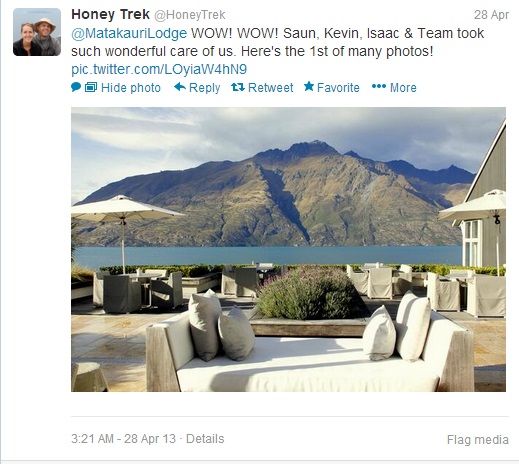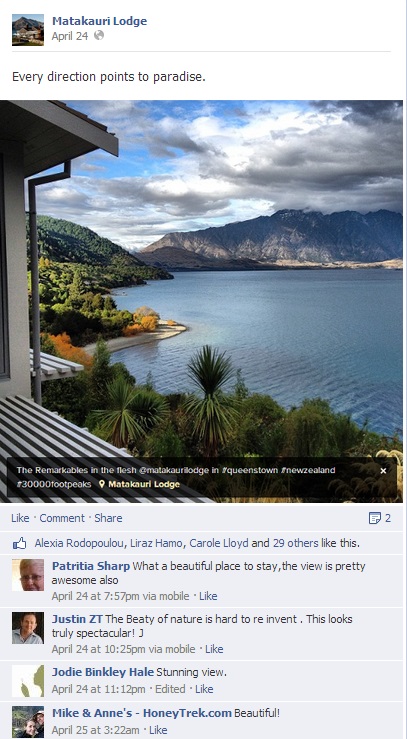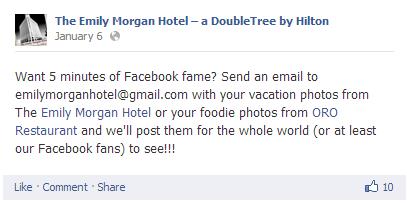What is user-generated content?
What do Wikipedia, YouTube, and Tripadvisor all have in common? They are all websites that rely heavily on user-generated content. I use the term “content” loosely, as it can vary from credible facts and creative media to opinion-based reviews and personal stories… you get the picture.
User-generated content can be advantageous for gathering information about a hotel’s amenities and services or learning about a travel experience from a previous guest’s point-of-view, but it can also be controversial because this information is provided by the public and is often uncensored. Does that mean that user-generated content is not credible? No, that is not what it means. It means that a reader or viewer should consider the source when determining whether or not to trust the recommendation or story. For instance, you may trust the Wall Street Journal with world news more than your friend. However, if you’re seeking hotel recommendations in New York, you may be more likely to take your friend’s opinion over that of Frommer’s, even though that travel guide tends to be a very trusted source. Your inclination to trust a source will likely depend on the type of information you are seeking. Also, keep in mind that most UGC is regulated or edited to some extent to ensure that the content meets the site’s standards, even massive sites like Wikipedia. Jimmy Wales, Founder of Wikipedia, has created and successfully implemented a voluntary governing force of editors for the user-generated content site to combat those “party of jerks” that every so often intervene with the “party of thoughtful.”
A penny for your thoughts?
…not so much in the world of user-generated content. No one is actually paying for the content; rather people voluntarily share it as a means of collaboration. There might be an explicit, tangible incentive, such as producing content for the chance to win a prize, but more often than not, people are actually providing their content for the greater good. Yes, those people still exist.
What motivates people to voluntarily provide this content for free? The internet is an open platform for people to share their personal thoughts and experiences with the public, and many people simply want their voice to be heard. In a world where ever-expanding social networks are the norm, people enjoy cultivating a sense of community online; connecting with others over a mutual interest (staying at the same hotel), sharing their wisdom to show themselves as the “expert”, or receiving some sort of acknowledged “status” based on level of involvement, like Tripadvisor badges for active reviewers.
How can hoteliers benefit from user-generated content?
Hoteliers can reap huge benefits from integrating user-generated content into their social media strategy! We are all well aware that people these days are more connected to their social networks than ever before, especially with the ease of use and accessibility provided by mobile phones. Think about guests that pass through the lobby each and every day. How often are they jabbing away on their smartphones, swiping through their Twitter feeds and “muploading” (mobile-uploading) pictures to Facebook? According to an IDC Research Report, Facebook is the third most popular activity on iPhones and Android phones behind email and web browsing.
So, whether or not you ask your guests to share their photos on Facebook and Twitter, I guarantee that they are already doing it. When describing the 5 Stages of Travel, Google states that at least 53% of leisure travelers say they share pictures of their vacations online, so it’s up to the hotel marketing team to strategically integrate, encourage, and help guide these positive guest experiences into their own social media marketing campaigns.
Guests are among the most powerful social influencers because people tend to trust and pay more attention to their own peers’ advice and recommendations than they would to an advertisement, commercial, or even a credible tour book. Imagine a guest shares a stunning photo of the scenic surroundings at their hotel, tagging the hotel’s Facebook page in the picture and adding a heartfelt comment such as, “WOW! The Team @MatakauriLodge took such wonderful care of us!” That is free PR! Plus, it’s coming directly from the mouth of a previous guest rather than the hotel’s own advertising campaign, which adds an element of credibility. The guest was not paid to stroke the hotel’s ego, so the positive review came from an unbiased source.
For the most part, you will find that your guests are more than happy to share their experience on Facebook or Twitter, usually enhanced with visual documentation, for the pure satisfaction of “bragging rights” (and to evoke envy on all of his or her Facebook friends stuck in rainy Chicago).
Ultimately, the hotel marketing team can create a dynamic strategy that encourages guests to share their own experiences, which will then become a promotional goldmine. Use these five helpful tips to make the most of user-generated content in your social media strategy.
1. Increase on-property visibility
Firstly, make sure that your social channels are all visible on property. Do you have your Facebook URL and Twitter handle on business cards, keycard packets, welcoming letters, lobby reader boards, or any other marketing collateral? Showing your guests that you are social savvy will remind them to engage with you online, whether it’s tagging your hotel in a photo, checking in on foursquare, or tweeting about the smooth sailing you experienced at check-in.
2. Enhance on-property engagement
You can take your social visibility a step further by creating an interactive on-property element that directly asks guests to engage, usually with an incentive to do so. For example, you can mark an X next to your pool and ask guests to upload photos of them standing in that spot to the hotel’s Facebook page to receive a free cocktail. Or you can create a scavenger hunt to pass out at the front desk, asking guests to tweet photos from various spots within your hotel. Exercise your creativity and ensure that your guests have fun with it! Make sure you choose your hotel’s best assets to show off so that your guests’ photos ultimately influence their Facebook friends to book!
3. Monitoring social media mentions
Along those same lines, make sure that you are actively monitoring all social mentions of your hotel and any other keywords that might be relevant. It might be helpful to use a social media monitoring tool (such as Revinate or Sprout Social), which will funnel in mentions across all social platforms. You will see several photos being posted on Twitter or Instagram that mention your hotel but the user might not have correctly tagged your hotel; therefore you wouldn’t have been notified of this mention without proactively searching or monitoring. Retweet these photos on Twitter or take a screenshot and upload them to your own Facebook page with a catchy one-liner that sums up the photo. These photos are on the Internet for anyone to see or use (otherwise these people would have their privacy settings higher), but if you want to ensure you are giving credit where credit is due, you can always mention the user’s Twitter handle or provide the Instagram URL.
4. Ask!
If you’re still a bit wary about using user-generated photos without an official consent, you can take a much more direct approach. If you have established a good fan base already, simply post a message to all of your Facebook fans or Twitter followers asking them to submit #FanPhotos to a specific email address or tweet them using a designated hashtag that you are actively monitoring. The photos will be collected and shared on the hotel’s Facebook page. A lot of people will be excited to share their own memories, but if you want to add an incentive you can offer to highlight a select few each week in a Facebook cover photo collage.
5. Host an interactive contest
If you have the budget, one of the best opportunities to create user-generated content is to host a contest on social media where guests submit photos, videos, memories, or goals to the marketing team and the randomly selected winner receives a free 2 night stay at the hotel. Of course, this comes with stipulations! The winner must serve as your “brand ambassador” in exchange for the free trip, providing live Facebook and Twitter updates throughout their stay on behalf of the hotel, which the hotel marketing team can then share and retweet. You might learn a thing or two from Fast Company’s recap of the amazing Tourism Queensland contest, which went viral for receiving such an overwhelmingly positive response. Of course, their contest was a bit of an exaggerated example and we don’t expect most hotels to have such accommodating budgets… but you get the picture.
Hotel guests are already actively sharing their travel experiences online with their social networks, so hotels need to amplify their own marketing strategies by taking advantage of an effective, user-generated content strategy that highlights positive guest feedback and experiences!







